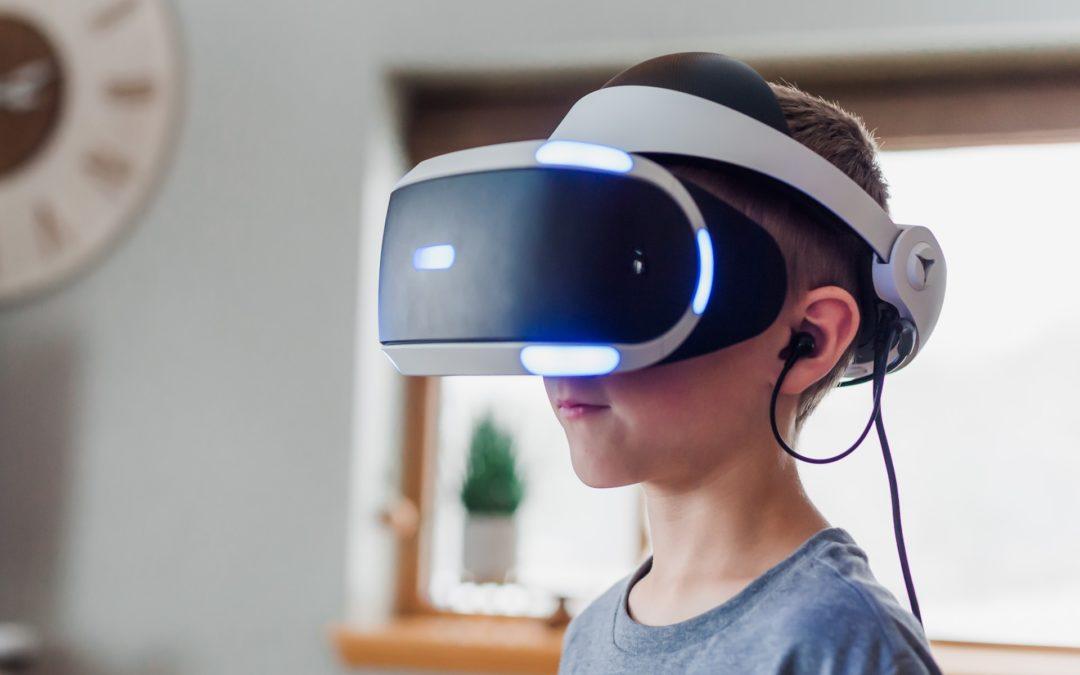As we stand on the brink of technological innovation, Virtual Reality (VR) emerges as a groundbreaking force with the potential to reshape the very fabric of society. In the years to come, the impact of VR is poised to extend far beyond the realm of immersive gaming experiences, reaching into diverse aspects of our daily lives. From revolutionizing education and healthcare to transforming how we work, interact, and perceive the world, VR holds the promise of introducing unprecedented changes. In this discussion, we delve into 20 potential societal impacts of Virtual Reality, envisioning a future where this transformative technology becomes an integral part of our collective experience, ushering in new possibilities and challenges alike.
What is Virtual Reality (VR)?
Virtual Reality (VR) is an immersive technology that simulates a realistic three-dimensional environment, creating an interactive experience. Users can explore and interact with this digital world using specialized headsets and controllers, engaging multiple senses to simulate a lifelike environment. VR finds applications in gaming, education, healthcare, and more, offering an unparalleled level of immersion and interactivity.
This cutting-edge technology works by tracking a user’s head and hand movements, adjusting the virtual environment accordingly, and providing a sense of presence within the digital realm. Through a combination of high-resolution displays, motion sensors, and realistic audio feedback, VR transports users to simulated worlds, fostering an illusion of being physically present in an entirely different space. The seamless integration of sight, sound, and interaction in VR experiences continues to revolutionize various industries, pushing the boundaries of what’s possible in entertainment, training, therapy, and beyond.
VR experiences can range from realistic simulations of real-world environments to fantastical, purely imaginative realms, offering users unparalleled opportunities for exploration and interaction. This technology has seen rapid advancements, with VR hardware becoming more accessible and affordable, driving widespread adoption across diverse fields.
The potential of VR extends beyond entertainment, with its applications expanding into fields such as education, enabling immersive learning experiences by transporting students to historical events or scientific phenomena. In healthcare, VR is utilized for therapeutic purposes, aiding in pain management, rehabilitation, and even surgical training simulations.
Moreover, industries like architecture and engineering leverage VR for designing and visualizing structures in a virtual space, allowing for enhanced collaboration and more efficient workflows. As this technology continues to evolve, the possibilities for innovation and integration into various aspects of everyday life are boundless, promising an exciting future for virtual reality.
20 Significant Societal Impacts of Virtual Reality
1. Education Revolution – Virtual Reality (VR) has the transformative potential to revolutionize education by introducing immersive learning experiences. Instead of traditional methods, students can delve into historical events, virtually visit distant planets, or engage in realistic simulations. This not only makes the learning process more captivating but also significantly enhances its effectiveness. The ability to experience and interact with subjects in a three-dimensional, virtual environment offers a novel approach to education that can cater to diverse learning styles, fostering a deeper understanding and retention of knowledge.
2. Healthcare Advancements – In the realm of healthcare, Virtual Reality stands as a potential revolutionary force. Realistic medical simulations powered by VR can redefine training for surgeons, allowing them to practice intricate procedures in a risk-free virtual space. Medical professionals, more broadly, can leverage VR to enhance their skills, offering a controlled environment for learning and refining techniques. This not only contributes to the continuous development of medical expertise but also reduces the potential risks associated with traditional training methods, ultimately improving patient outcomes.
3. Remote Work and Collaboration – With the increasing prevalence of remote work, Virtual Reality emerges as a tool to reshape the dynamics of professional collaboration. Virtual offices, facilitated by VR technology, offer a more natural and immersive space for colleagues to collaborate, fostering improved communication and teamwork. This innovation has the potential to bridge the gap between physical distances, providing a virtual environment that replicates the benefits of face-to-face interaction, thereby enhancing the overall efficiency and cohesion of remote teams.
4. Training and Skill Development – Industries such as aviation, manufacturing, and the military can harness the power of VR for training purposes, presenting a paradigm shift in skill development. VR-based training programs provide individuals with the opportunity to acquire and refine practical skills in a safe and controlled virtual environment. This not only enhances the effectiveness of training but also mitigates the risks associated with learning in real-world settings, contributing to increased safety, efficiency, and competence in various professional domains.
5. Therapeutic Applications – Virtual Reality is increasingly finding applications in therapeutic contexts, particularly in treating conditions like phobias, post-traumatic stress disorder (PTSD), and anxiety disorders. By providing a controlled and immersive environment, VR becomes a valuable tool for exposure therapy. Patients can confront and navigate through scenarios that trigger their conditions, offering a safe and structured method to address and overcome psychological challenges.
6. Entertainment Evolution – The entertainment landscape is on the cusp of a revolution facilitated by Virtual Reality. The immersive nature of VR opens up new possibilities for gaming, offering experiences that go beyond traditional forms of media. Virtual concerts and interactive storytelling within VR environments create novel avenues for entertainment consumption, providing users with an unprecedented level of engagement and immersion in digital content.
7. Social Interaction – Virtual Reality has the potential to redefine social interaction by creating immersive virtual spaces. These spaces, comparable in importance to physical social environments, allow people to interact in more meaningful and engaging ways. Whether it’s socializing with friends, attending virtual events, or collaborating on projects, VR offers an avenue for social connectivity that transcends the limitations of traditional online communication methods.
8. Architectural Design and Visualization – Architects and designers can leverage Virtual Reality to revolutionize the process of architectural design and visualization. VR allows professionals to create and explore detailed three-dimensional models of buildings in a virtual environment. This immersive experience offers a more realistic understanding of spaces before they are physically constructed, enabling architects to make informed decisions and iterate designs more efficiently.
9. Tourism and Exploration – The travel experience is poised for transformation through Virtual Reality, particularly in the realm of tourism. VR enables virtual tourism, allowing individuals to explore destinations and historical sites from the comfort of their homes. This not only provides a more accessible means of travel but also contributes to reducing the environmental impact associated with physical tourism.
10. Sports Training and Analysis – Athletes can harness the power of Virtual Reality for training purposes, ushering in a new era of sports preparation and analysis. VR simulations allow athletes to immerse themselves in realistic game scenarios, providing a dynamic training environment. Moreover, the technology facilitates the analysis of performance data, offering valuable insights that can be instrumental in improving skills and decision-making in the field.
11. Cultural Preservation – Virtual Reality emerges as a crucial tool for cultural preservation by facilitating the creation of virtual museums and historical reconstructions. These immersive experiences allow individuals to delve into and appreciate different cultures, providing a dynamic and accessible means of preserving and sharing cultural heritage. Virtual museums can transcend physical limitations, reaching a global audience and fostering a deeper understanding and connection to our collective history.
12. Virtual Real Estate – The innovative concept of virtual real estate is gaining prominence, presenting individuals with the opportunity to buy, sell, and develop virtual properties within VR platforms. This not only introduces a new dimension to economic opportunities but also blurs the lines between the physical and virtual worlds. As virtual environments become increasingly sophisticated, the virtual real estate market has the potential to become a thriving digital economy, offering unique possibilities for investment and entrepreneurship.
13. Environmental Awareness – Virtual Reality emerges as a powerful tool for environmental awareness by providing immersive experiences that vividly highlight the impact of climate change and the importance of conservation. Through VR, individuals can virtually witness environmental changes, fostering a deeper connection to the natural world. This heightened awareness has the potential to inspire positive environmental action and a greater sense of responsibility towards sustainable practices.
14. Job Interviews and Recruitment – VR technology has the capacity to streamline the job interview process by enabling companies to conduct virtual interviews. This offers a more realistic assessment of candidates’ skills and suitability for a role, transcending the limitations of traditional remote interviews. VR-integrated recruitment processes can provide a more immersive and comprehensive evaluation, potentially enhancing the match between employers and candidates.
15. Mental Health Support – In the realm of mental health, VR applications offer a range of therapeutic experiences. From relaxation simulations to mindfulness exercises, VR provides a unique and immersive avenue for mental health support. These applications aim to reduce stress and anxiety by creating controlled and therapeutic virtual environments, offering individuals new tools for managing and improving their mental well-being.
16. Crime Scene Reconstruction – Law enforcement can leverage Virtual Reality to reconstruct crime scenes in a virtual space, revolutionizing investigative processes. VR enables a more accurate and detailed representation of events, aiding in the analysis and understanding of complex crime scenes. This application has the potential to enhance the accuracy of investigations and contribute to the pursuit of justice.
17. Accessibility and Inclusivity – VR holds the promise of making experiences more accessible for individuals with disabilities. By offering simulations and environments that cater to various needs, VR can break down barriers and create inclusive spaces. This potential extends to educational, recreational, and professional settings, opening new possibilities for participation and engagement for individuals with diverse abilities.
18. Skill-Based Competitions – The immersive nature of Virtual Reality opens avenues for new forms of competitive events. Individuals can participate in skill-based challenges and sports within virtual environments, transcending geographical constraints. This evolution in competitive landscapes introduces novel opportunities for skill development, entertainment, and community engagement within the virtual realm.
19. Economic Impact – The growth of the Virtual Reality industry itself is poised to contribute significantly to the economy. This includes job creation in areas such as software development, content creation, and related fields. As VR becomes more integrated into various sectors, it is likely to spur innovation and economic growth, offering new employment opportunities and driving advancements in technology.
20. Ethical and Social Challenges – As Virtual Reality becomes increasingly ingrained in society, it brings forth a host of ethical considerations. Privacy, data security, and the nuanced boundary between the virtual and real worlds pose complex challenges. Addressing these concerns will be crucial in ensuring responsible and ethical development and use of VR technology. Striking a balance between innovation and ethical considerations will be paramount as society navigates the evolving landscape of Virtual Reality.
Possible Ways Virtual Reality Impacts Society
In the coming years, Virtual Reality (VR) is poised to exert a profound influence on society, touching various facets of our lives. One significant impact lies in the realm of education, where VR is expected to revolutionize learning by providing immersive experiences. Students may virtually explore historical events, journey to distant planets, and engage in realistic simulations, transforming education into a more engaging and effective endeavor. Healthcare is another arena set for transformation, with VR offering realistic medical simulations for training surgeons and enhancing the skills of healthcare professionals in a risk-free environment.
As the landscape of work evolves, VR is likely to redefine remote collaboration by creating virtual offices, fostering improved communication and teamwork in the era of increasing remote work. Industries such as aviation, manufacturing, and the military will benefit from VR-based training programs, enabling individuals to acquire and refine practical skills safely. Therapeutically, VR is anticipated to play a crucial role in mental health treatments, providing therapeutic experiences, relaxation simulations, and mindfulness exercises to alleviate stress and anxiety. The entertainment sector is on the brink of an evolution, with VR poised to redefine gaming, offer immersive virtual concerts, and revolutionize storytelling experiences.
Social interactions may undergo a transformation as VR creates new avenues for immersive and meaningful connections in virtual spaces. Architectural design and visualization, tourism, and sports training and analysis are also expected to witness significant changes with the integration of VR. From preserving cultural heritage through virtual museums to the emergence of virtual real estate markets, VR is set to create economic opportunities and redefine the way we experience and interact with the world. While these advancements promise a future where VR becomes increasingly integrated into our daily lives, ethical considerations, privacy issues, and the need for thoughtful regulations will be essential aspects to address as we navigate the evolving landscape of virtual reality.
How will virtual reality affect social interaction?
In the not-so-distant future, the fabric of human interaction will undergo a seismic shift, where the boundaries of physical space dissolve into an immersive digital realm. Virtual Reality (VR), once a realm of sci-fi dreams, is poised to revolutionize social interaction in unprecedented ways.
Imagine stepping into a world where distance is no barrier to connection. VR promises to erode the constraints of geography, allowing individuals separated by continents to convene in shared virtual spaces as effortlessly as if they were in the same room. From lively discussions in a virtual café to collaborative work sessions in a digital office, the potential for meaningful, real-time interaction transcends the limitations of physical presence.
This metamorphosis extends beyond mere communication; it’s a renaissance of experience. With VR, individuals can inhabit diverse environments and scenarios, fostering empathy through firsthand immersion. Whether walking through historical epochs or exploring distant planets, the ability to virtually inhabit these spaces ignites new depths of understanding and compassion.
Yet, amidst this digital revolution, questions linger about the impact on our fundamental social dynamics. Will the richness of face-to-face interaction be diluted in the digital ether? Or will the capacity for nuanced expression and genuine connection find new channels of expression in this virtual landscape?
Undoubtedly, challenges will arise. As with any technological leap, ethical considerations loom large. Privacy, identity, and the blurring lines between the virtual and the tangible demand careful navigation. Balancing the allure of boundless possibility with responsible usage will be pivotal in shaping the societal impact of VR.
Moreover, the democratization of VR technologies remains crucial. Ensuring accessibility and inclusivity will be vital in preventing the creation of a digital divide, where only select groups benefit from the transformative power of virtual realms.
Ultimately, the future of social interaction in a VR-dominated landscape is an intricate tapestry woven from innovation, adaptation, and ethical consciousness. It presents a canvas ripe for exploration, where the convergence of technology and humanity promises to reshape the very fabric of how we connect, empathize, and thrive in an ever-evolving world.
Read also: 30 Amazing Ideas for a Reunion with Friends
The Most Popular on BitGlint

Gene-Editing Babies: 20 Pros and Cons to Consider
The topic of gene-editing babies is one that stirs a lot of discussion and debate. It's about scientists using...

Top 30 Individual Autonomy Examples & Why It Matters
Individual autonomy, the capacity to make one's own decisions and govern oneself, stands as a cornerstone of personal...

Top 20 Cultural Hybridization Examples & Definition
Cultural hybridization is a fascinating phenomenon where different cultures blend to create something entirely new and...

Top 20 Moral Subjectivism Examples & Definition
Moral subjectivism asserts that ethical judgments and moral values are based on individual preferences and...

Top 20 Dualism Examples & Definition
Dualism, a concept deeply rooted in philosophy, theology, and psychology, refers to the existence of two distinct,...

Top 30 Symbolic Archetypes Examples & Their Meaning
Symbolic archetypes are the building blocks of storytelling, weaving deep significance and universal themes into...

Top 20 Pluralism Examples & Definition
Pluralism represents the fabric of a society woven with varied threads – different beliefs, cultures, and...
Get Inspired with BitGlint

